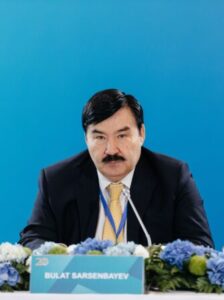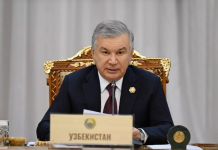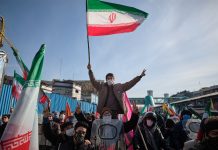Kazakhstan, between Asia and Europe, East and West, has become a center of harmonious intersection of different languages, traditions, and cultures. The people of Kazakhstan have absorbed the traditions of different civilizations and religions, the spirit of tolerance and openness.
One of the most important global achievements of Kazakhstan today is the initiation of the Congress of the Leaders of World and Traditional Religions. Over the years, Astana has successfully hosted seven Congresses.
Against the background of globalization of modern challenges and threats, the forum has become one of the first to promote intercivilizational dialogue at the global level.
Over the past two decades, spiritual leaders have demonstrated that dialogue, mutual understanding and respect are powerful forces that ensure peaceful coexistence of all cultures and religions.
It significantly contributed to Kazakhstan’s success in forging a stable and harmonious society that lives in peace in our country today.
On Oct. 11, 2023, Astana hosted the 21st meeting of the Secretariat of the Congress of Leaders of World and Traditional Religions, chaired by Chairman of the Senate of the Parliament of the Republic of Kazakhstan – Head of the Congress Secretariat Maulen Ashimbayev.
Kazakhstan’s visionary policies have been praised by religious leaders from around the world as a model for the international community in the future. To preserve this success, the participants approved the Development Concept of the Congress of Leaders of World and Traditional Religions for 2023-2033 “Religious leaders stand for a fair and peaceful world,” developed at the initiative of the President of Kazakhstan Kassym-Jomart Tokayev.
The concept offers an updated vision of the development of our forum for the coming years by combining the efforts of religious leaders to help solve the most pressing problems of humanity.
The mission of the Congress is to strengthen further mutual understanding and respect between communities of world and traditional religions, to realize the potential of spiritual diplomacy to help create a just, safe and prosperous future. The key element of the development paradigm of the Congress is to unite the efforts of religious leaders in facilitating solutions to the humankind’s most pressing problems.
The participants identified the following objectives: the further development of the Congress, the promotion of fundamental spiritual and moral values, the unification of efforts to solve global problems of the modern world, the establishment of mutual respect, peace and harmony, the prevention of the use of religious feelings of people to incite and escalate conflicts, and the protection the objects of historical and cultural heritage.
The Concept outlines the mechanisms for promoting the Congress’ mission at a new stage.
The Congress program will include a Forum of Young religious leaders with the participation of young spiritual leaders and secular youth. The involvement of the young generation is the key to preserving the continuity of the intercivilization and interfaith dialogue and protecting them from the influence of extremist ideology. At the same time, it is a priority for the participants to involve women, people with disabilities, and representatives of other interested social groups in the activities of the forum.
The systematic work of the Congress entities during the intervals between congresses are based on the implementation of the Road Map of the Congress Secretariat for the promotion and practical implementation of the declaration’s provisions. As part of the implementation of this point of the Concept, various events will be held in Kazakhstan and abroad (online/offline international meetings, round tables, conferences, sermons, lectures, exhibitions, seminars, etc.) aimed at promoting and implementing the mission, goals and declarations of the Congress.
The development of spiritual diplomacy and strengthening the partnership of the Congress with international institutions and platforms are among the priorities of the Concept. The document is aimed at deepening the cooperation of the Congress with UN agencies and other credible international entities to expand the circle of partners and the geography of the forum’s activities.
It is proposed to introduce the Institute of Goodwill Ambassadors of the Congress from among prominent and highly reputable religious, political and public figures in order to develop the potential of spiritual diplomacy. The Concept aims to further contribute to creating a world in which spiritual and moral values are not merely preserved, but become fundamental.
The Congress entities cooperate with reputable international organizations and structures on interfaith and intercivilizational dialogue. Considering the significant and increasing role of multilateral platforms in addressing the most important issues on the international agenda, the Congress will continue to expand the number of participants and strengthen cooperation with international organizations.
The Congress is a crucial element of Kazakhstan’s policy aimed at strengthening dialogue and cooperation both domestically and internationally. The declarations adopted at all previous forums invariably condemned radicalism, violence and conflicts, regardless of means they are justified by. In today’s complex realities, it is important that religious leaders, sitting at the same table, demonstrate to the whole world an example of goodwill overcoming any differences. This, in my opinion, is the main mission and feature of our Congress.
It is worth noting that the Ministry of Culture and Information of Kazakhstan, together with the N.Nazarbayev Center for Development of Interfaith and Intercivilization Dialogue, has already begun systematic implementation of the Concept by distributing this document among the foreign partners, participants of the Congress and Secretariat, embassies of Kazakhstan and promoting the Concept at the national and international levels within the framework of round tables and expert meetings.
We believe that world religious leaders could significantly contribute to overcoming the global problems of the modern world together – poverty, inequality, and disintegration. They can contribute to ceasing wars and conflicts and spread a culture of dialogue and mutual respect.
 The author is Bulat Sarsenbayev, the Chairman of the Board of the N.Nazarbayev Center for Development of Interfaith and Intercivilization Dialogue.
The author is Bulat Sarsenbayev, the Chairman of the Board of the N.Nazarbayev Center for Development of Interfaith and Intercivilization Dialogue.






